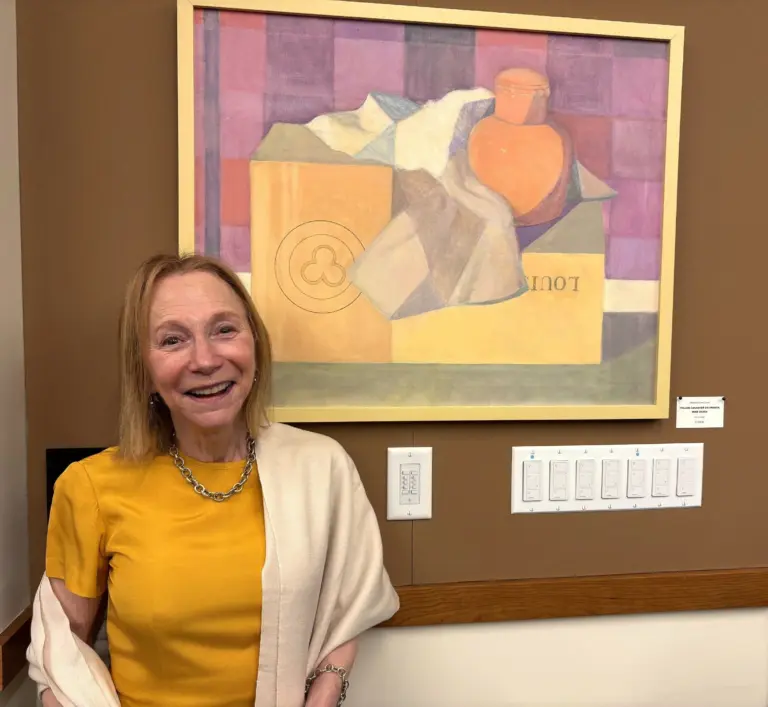
Basic Information
Full Name: Tina Courpas
Office Sought: State Representative, 149th District
Contact Information
info@tinacourpas.com;
203-814-7750; tinacourpas.com
General Questions
Top Three Priorities if Elected
1. Affordability (Taxes, Electric Rates): Lower taxes and lower electric bills are a priority for me. CT has the 2nd highest state/local tax burden in the US and 2nd highest electric rates in the US, largely due to out-of-control government spending and poor policies. We began to control our spending in 2017 through adoption of CT’s Fiscal Guardrails, and they worked for 7 years. Unfortunately, the Legislature lost its resolve in 2024 and began to overspend again. We can turn CT’s economy around and lower taxes if our leaders would stay the course. We also must lower electric bills. This dramatically affects affordability and hits the most vulnerable the hardest. WE can improve affordability in CT with better leadership.
2. Local Control of Zoning: This issue has the most potential to render Greenwich and Stamford unrecognizable in 10-20 years. We need more affordable housing in the state, but state mandates like 8-30g have not worked. They take decision making away from Towns and ignore local concerns about infrastructure, the environment, roads, sewers, historical preservation, etc. We need an overhaul of 8-30g and a framework for supporting Towns to accomplish housing goals on their own.
3. Public Safety: Car thefts were up 33% in 2023 statewide. CT’s highways have never been more unsafe. We have implemented policies in CT which prevent police from doing their jobs. I have heard at many doors that residents are concerned about public safety. This too is fixable with better policies.
Professional, Volunteer, or
Public Service Experience
Each phase of my professional career has prepared me for this role.
1. I practiced law and worked in investment banking for over two decades – Strong technical and analytical skills. My legal training has prepared me to read, analyze and write legislation. I have the financial skills to understand financing, budgets, markets, and the state’s complicated fiscal issues.
2. I ran two non-profit organizations – Proven Leader. I ran two non-profits including the Permanent Commission on the Status of Women in CT (PCSW), a bipartisan organization which has advocates for women’s rights in CT. In both, I was responsible for deploying donors’ money to a common vision, just as legislators deploy other people’s tax dollars. I will take that seriously. I also have experience managing teams and the ability to listen, lead, and collaborate. This is important to being an effective legislator.
3. I have direct bipartisan experience in Hartford. Under my leadership, the PCSW produced a research study on the economic impact of COVID-19 on CT’s women. It was a massive bipartisan success, involving over 1,000 women statewide, legislators, the Governor’s office and business leaders. The study informed state policy after COVID. I have experience bringing diverse points of view together to get things done.
4. I have experience serving my community. I served at the state level on CT Collective for Women and Girls and Connecticut Governor’s Council on Women and Girl. I also served on the Executive Committee of the Princeton Women’s Initiative and Board of St. Paul’s School for Girls. I served on the Princeton School of Public and International Affairs Advisory Board, volunteered at Domus Kids (Stamford nonprofit supporting underserved kids to complete K-12), and served on the parent boards of my children’s schools. I have been a Sunday School teacher and started a youth Greek dance group in my Greek community. Finally, I have volunteered for numerous local political campaigns.
Policy Questions
Local Control: How do you propose to protect your district’s control over zoning decisions? What is your approach to balancing affordable housing needs with preserving the town’s character?
1. Vote against Bills which seek to expand state control even more. The 2024 legislative season contained numerous Bills which expanded state control even farther than 8-30g. I testified on 5 of those Bills as a private citizen. I would have voted against HB 5390, “Work, Live, Ride,” which eroded local control. We need legislators to advocate against and vote “no,” on these bills.
2. Repealing or Amending 8-30g and Other Solutions. I would balance the Towns’ affordable housing needs with preserving its character by: a) repealing 8-30g, a law which has not worked for 35 years, b) amending 8-30g to include housing which is affordable but not currently counted for purposes of this law, such as naturally occurring housing such as that provided by Greenwich Hospital, country clubs, and private schools, and Accessory Dwelling Units (ADUs), c) reform the definition of affordable housing to include more middle-income housing, and d) improve Towns’ ability to retrofit certain commercial properties (e.g., nursing homes) to become housing units.
Utilities: What steps have you taken/will you take to address rising costs of electricity, natural gas, and water? Please explain your stand on the current situation with Aquarion.
During COVID, CT was one of 24 states which imposed a moratorium on electric bills – if someone could not pay, their electricity wasn’t turned off. I support that. But CT’s moratorium lasted for 4 years – longer than any state. As a result, $200 million of unpaid bills accumulated. In February 2024, Republicans advocated that Federal COVID-relief funds should be allocated to that $200 million of unpaid bills, so that ratepayers would not get stuck with that charge. I would have voted for that, but that proposal was rejected. Then, in the summer when ratepayers saw that charge on their electric bills, I advocated and supported those Legislators who tried to convene a Special Session to potentially reallocate some of those Federal COVID relief funds to fix the problem then. That did not happen either.
If elected, I would: 1) recommend moving the Public Benefits portion of our electric bill (which funds 41 government programs) under legislative review so that it can be vetted, 2) support capping the rates the utility companies can pay for supply, 3) advocate for PURA’s independence from DEEP so that consumers can have an independent advocate, and 4) address CT’s long term energy issues through an energy plan which is less expensive, cleaner and greener.
Aquarion Issue: RWA’s acquisition of Aquarion is likely to result in a significant increase in our water bill, another necessity of people’s lives. I testified in New Haven this summer against that acquisition, raising concerns about another rate increase, especially for those with a fixed or low income.
Economy: How will you address the economic challenges posed by inflation? What legislative measures will you support to ease the financial burden on households and businesses in your district?
Though inflation is driven mostly by national and international economic forces, the state can still do a lot for its citizens on affordability. I would take the following legislative measures if elected: 1) defend CT’s guardrails because low taxes start with controlling spending, 2) repeal CT’s gift tax (we’re the only state with a gift tax), 3) repeal CT’s estate tax (we’re 1 of only 12 states with an estate tax), 4) provide a $2,000 per child tax credit to immediately help the middle class, 5) propose a statewide cap on property taxes, 6) adopt short and long term utility relief (see above), and 7) lessen red tape and regulatory burdens on CT’s businesses to attract them to the state.
Supermajority: What does having a supermajority in the Connecticut legislature
mean to you and to your district?
This is a big concern. We are three seats away from one party (Democrat) controlling 70% of the Legislature, just like CA, NY and IL. CT would become a one-party state. If this happens, our moderate Governor Lamont’s veto will be gone since his veto can simply be overridden by the 70% supermajority. This lacks balance and diversity of opinion; the most extreme positions have greater influence and there is nothing to stop them. This lack of balance is especially problematic for the 149th District, which has a diverse set of voters: 40% Unaffiliated voters, 30% Republicans and 30% Democrats. If we become a ONE-PARTY state, the Unaffiliated and Republicans (70% of the district) will not have any voice in our state government. We need all voices to be heard to truly represent the people.
Bipartisanship: How would you describe the current political environment in Connecticut? If elected, how will you contribute to improving the tone of political discourse and foster cooperation among different political viewpoints?
I don’t think CT politics are as adversarial as at the national level, but they could be improved. From the beginning, I have said that my opponent is not my enemy and have tried to have no toxic politics in my campaign. I have focused on the issues and how my opponent and I differ on them and supplied the backup facts so that voters can see the facts for themselves. I have avoided personal attacks, character assassinations, and the inflammatory labels we hear at the national level. I will keep trying. If elected, I will focus on building relationships and finding commonalities across the political spectrum. There is much more that unites versus divides us. Once you have a human connection, so much more can be accomplished.
Your View: What should we have asked that we did not?
What is your biggest motivation? My children. I have four children, ages 15-22 – two boys and two girls. They are the greatest joy, purpose and motivation of my life. When I think about the future of CT, I think about them.
Passing laws affects people’s lives and charts the direction of the state. Every law has to answer the question: Does this improve the lives of the people of CT? Regardless of whether it is a good law, or well-intentioned but poorly drafted, or a “bad” law” rushed through for a political agenda, it affects people Day 1. Bad laws are hard to undo or fix. I will take that awesome responsibility seriously and truly vote with the best interests of the people of the District.
I care very much about this community. We must put the state on a right course so that all of our children and grandchildren can return to their hometown and raise their own families in this very special place.




